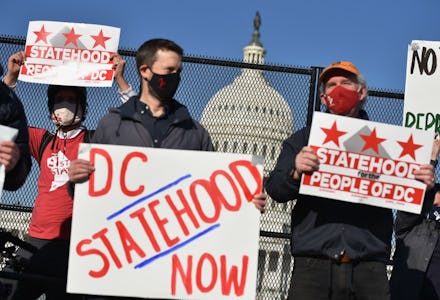We're closer than ever to having a 51st state

Flags festooned with 51 stars billowed across Washington, D.C., on Monday, as advocates for D.C. statehood appeared before Congress to make their case. The hearing, held by the powerful House Oversight and Reform Committee, was officially convened to consider H.R.51, a bill to officially transform the District of Columbia into "The State of Washington, Douglass Commonwealth," thereby granting its residents the federal representation it has gone without for centuries.
The House had previously passed an identical iteration of the bill last year. "D.C.'s population of 712,000 is larger than that of two states and the State of Washington, D.C. would be one of seven states with a population under 1 million," D.C. Del. Eleanor Holmes Norton, the bill's initial sponsor, said during her opening statement. "D.C. pays more federal taxes per capita than any state and pays more federal taxes than 21 states. D.C.'s budget is larger than those of 12 states. Eighty-six percent of D.C. residents voted for statehood in 2016. In fact, D.C. residents have been petitioning for voting rights in Congress and local autonomy for 220 years."
For proponents of D.C. statehood, the issue is simple: Residents of the nation's capital are granted shockingly little say, despite playing house to America's lawmakers. Norton, their delegate, has no vote in Congress.
"Congress has two choices," Norton continued. "It can continue to exercise undemocratic, autocratic authority over the American citizens who reside in our nation’s capital, treating them, in the words of Frederick Douglass, as 'aliens, not citizens, but subjects.' Or it can live up to this nation's promise and ideals, end taxation without representation." Norton added that because Democrats currently control the House, the Senate, and the White House, statehood for the District has "never been closer."
Despite the compelling arguments in favor of D.C. statehood, the fact remains that Republicans — particularly in the Senate — are loathe to consider admitting a new state into the union, thereby adding two new senators who, given D.C.'s voting history, would almost certainly be Democrats. (Notably, this is what Republicans themselves essentially did in the late 19th century, when the Dakota territory was split into two separate states to add a total of four GOP senators to the roster.)
Adding a new state would require Senate Democrats to overcome the 60-vote filibuster threshold, making admission a virtual non-starter for now given the upper chamber's 50-50 split. The growing chorus of residents clamoring for D.C. statehood is one of the animating forces behind the Democrats' (uneven) push to reform the filibuster, or even abolish it altogether.
In the meantime, Republicans opposing the measure offered their argument against D.C. statehood, with invited witness Zack Smith, a legal fellow with the conservative Heritage Foundation, suggesting at one point that residents of the District currently enjoy outsize influence on Congress already. Per Smith's prepared remarks:
How many committee members on their way to this hearing today passed yard signs, banners, or even billboards advocating D.C. statehood? I certainly did. Nowhere else in the country would it be possible to reach so many members of Congress so easily.
Because if there's one thing that can really play a serious role in helping shape the balance of political power in this country, it's making sure that representatives like Steve Scalise or Chip Roy see your yard sign, which is definitely a solid replacement for having an actual congressional vote.
Ultimately, pending some sort of seismic shift in the Senate, the transition from "District of Columbia" to "Douglass Commonwealth" is still a long ways away. But if Monday's hearing showed anything, it's that the dream of legitimate representation for the hundreds of thousands of residents of the nation's capital isn't going anywhere anytime soon.